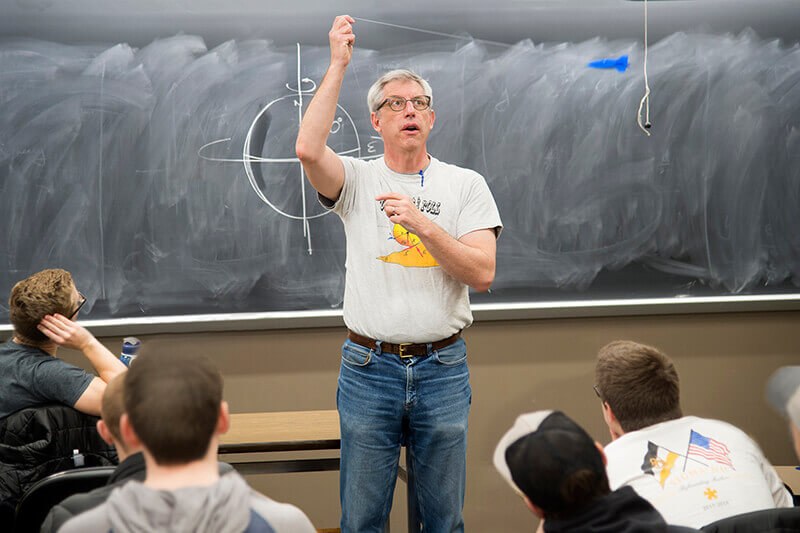April 24, 2018
Murphy Award: Mark French
 Mark French, professor of mechanical engineering technology in the School of Engineering Technology. (Purdue University photo/Mark Simons)
Download image
Mark French, professor of mechanical engineering technology in the School of Engineering Technology. (Purdue University photo/Mark Simons)
Download image
Five exceptional teachers have been selected as recipients of the 2018 Outstanding Undergraduate Teaching Award in Memory of Charles B. Murphy. This Q&A focuses on Mark French, professor of mechanical engineering technology in the School of Engineering Technology.
Years at Purdue: 13.
Teaching interests: Experimental mechanics and stringed instrument design.
On how his work as an engineer inspired him to push more students into similar rewarding careers: I knew I wanted to be a professor long before coming to Purdue. However, I didn’t think I had any business teaching young engineers until I had made my living as one. That time made me think about how what I did for a living related to what I learned in college. I got a good theoretical preparation but very little practical knowledge. When I graduated with my bachelor’s degree, I didn’t even know that there were standard bolt sizes or what they were. I guess nobody thought that was important enough to mention.
On his project shooting pingpong balls supersonically: Getting to go on a TV show was probably the peak of that project (so far), but not the beginning of it. When my students, Jim Stratton and Craig Zehrung, and I made the first supersonic pingpong gun, it was just to see if it was possible. I put a short article out on the Physics ArXiv and that started to draw attention. We were in magazine and websites and were interviewed by different organizations. Jim and Craig were even part of a BBC show. The segment on the "Tonight" show came later.
On understanding the mixing of science and art in the study of designing musical instruments: The difference between a nice but unremarkable guitar and a very good one is subtle. It’s probably below our threshold of analysis for now. There is a need for people to apply physical principles see if we can clearly characterize the difference. Also, the guitar industry seems to run on a mix of empirical knowledge and design guidelines. There is essentially no engineering analysis. It’s the opposite of aerospace, where we seldom make things we can’t analyze. The guitar industry is using technology to improve manufacturing and I’d like to do my part to encourage more thoughtful design processes.
On the importance of undergraduate research: Few problems in students’ careers will be nice and tidy like the ones they typically see in class. We use those because they make good teaching tools. I think it’s important for students to have experience with an open-ended problem. I did a small research project in undergraduate school and it was a great experience. If I have a concern about undergraduate research, it’s that we will naturally focus on the star students because they can contribute the most to research projects. We might need to remind ourselves that undergraduate research is more about the student than the professor.
On what makes his teaching his own instead of like what others do: I have to confess that I learned more about teaching from experiment and from being mentored by older faculty members than from reading the research. I try to stay connected with the literature but I think one of the things we keep finding out was that Socrates was often right. Students learn best from people with whom they form a connection and teaching is much more than the act of just transmitting information. There is a wonderful Buddhist saying: When the student is ready, the teacher will appear. I think there is great wisdom in this. I think it’s unrealistic to expect our students to learn on a convenient schedule. When my students are ready to learn, I try to be there.
On what led him to choose a YouTube channel as a teaching approach: When I was in college, back before the dinosaurs turned to coal, the professor and the textbook were my main sources of information. Those days are, thankfully, long gone. My professors were mostly pretty good people, but they weren’t usually available when I needed them. My students have grown up interconnected with the breadth of human knowledge in a way I could never have imagined. YouTube lets me post short videos addressing specific subjects so viewers can see how to solve their own problems whenever and wherever they need it. If they need another video, I can shoot one quickly and post it. Right now, I have 265 videos, with more coming. I don’t use textbooks in my classes anymore and have begun to wonder how relevant they are any more.
Writer: Kelsey Schnieders Lefever, kschnied@purdue.edu

